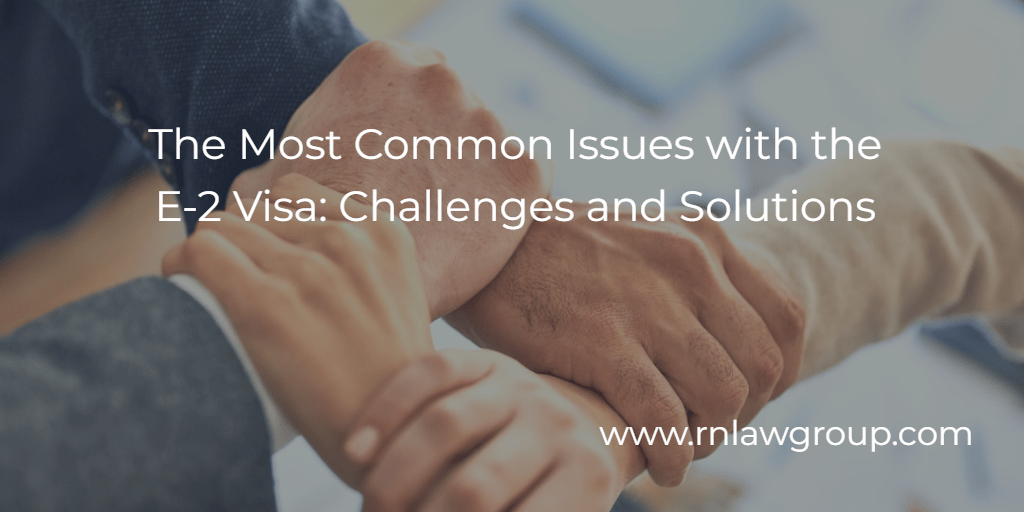
The Most Common Issues with the E-2 Visa: Challenges and Solutions
Introduction:
The E-2 visa, also known as the Treaty Investor Visa, is a nonimmigrant visa category that allows individuals from certain treaty countries to enter the United States for the purpose of investing a substantial amount of capital in a U.S.-based business. While the E-2 visa can be a valuable pathway for foreign investors, it is not without its challenges. In this article, we will explore the most common issues faced by E-2 visa applicants and provide potential solutions to overcome these hurdles.
- Eligibility and Treaty Country Requirements:
One of the initial challenges for E-2 visa applicants is establishing eligibility. The first criterion is being a citizen of a country that maintains a treaty of commerce and navigation with the United States. While many countries have such treaties, some nations do not, which can limit the availability of the E-2 visa as an option. Additionally, the nature of the investment must meet certain requirements, such as being substantial and primarily aimed at directing and developing a business enterprise.
To overcome this issue, applicants should first determine if their country of citizenship has an E-2 treaty with the United States. The U.S. Department of State provides a list of countries eligible for the E-2 visa on its website. If a country lacks an E-2 treaty, applicants may explore alternative visa options, such as the EB-5 Immigrant Investor Program or the L-1 Intracompany Transferee Visa. It is essential to consult with an immigration attorney to determine the most suitable visa category based on individual circumstances.
- Investment Size and Risk:
Another significant concern for potential E-2 visa applicants is the requirement of making a substantial investment. While there is no fixed minimum investment amount, the investment must be considered substantial in relation to the total cost of purchasing or creating the business. This poses a challenge for individuals with limited financial resources who may find it difficult to meet the investment threshold.
To address this issue, applicants can explore various financing options. Obtaining loans or seeking partnerships with U.S. investors are potential solutions to overcome financial constraints. Thorough market research and a well-developed business plan can also help convince immigration officials that the investment is viable and has a high likelihood of success. By demonstrating a clear understanding of the business’s potential and its market value, applicants can strengthen their case for the E-2 visa.
- Marginality and Job Creation:
E-2 visa applicants must demonstrate that the investment will create job opportunities for U.S. workers. This requirement ensures that the visa is not used for personal gain but benefits the U.S. economy. However, determining the number of jobs required and proving their creation can be challenging, especially for start-ups or small businesses.
To address this issue, applicants can provide a detailed business plan that outlines the job creation projections, the roles and responsibilities of each employee, and the expected economic impact. Collaboration with a qualified immigration attorney and a thorough understanding of the job creation requirements can significantly strengthen the visa application. Additionally, applicants should maintain accurate and detailed records of the business’s financials, employment records, and any changes or updates to the investment. These records can serve as evidence during the application process and subsequent renewals.
- Visa Renewal and Duration:
Admission to the United States with E-2 visa is granted for an initial period of two years and can be renewed indefinitely as long as the investment and business remain viable. However, visa renewals can be complex and time-consuming, leading to uncertainties and disruptions in long-term planning.
To ensure a smooth renewal process, it is crucial to maintain accurate and detailed records of the business’s financials, employment records, and any changes or updates to the investment. Applicants should be prepared to provide evidence of the ongoing operation and success of the business. Seeking guidance from an experienced immigration attorney during the renewal process can help navigate any potential issues and streamline the application. By staying proactive and organized, applicants can increase their chances of a successful renewal and maintain their E-2 visa status.
- Dependents’ Work Authorization:
While E-2 visa holders can bring their spouse and unmarried children under the age of 21 as dependents, the ability of dependents other than the spouse, to work in the United States is not automatically granted. Dependents must separately apply for work authorization, which can be a time-consuming and complex process.
To address this issue, dependents should consult with an immigration attorney to determine the most appropriate work authorization category based on their qualifications and goals. Exploring alternatives such as the H-1B or L-1 visa categories may provide additional opportunities for dependents to work in the U.S. It is important to note that dependents cannot work until they have obtained the necessary work authorization, and violating this requirement can have serious immigration consequences.
Conclusion:
The E-2 visa presents a valuable opportunity for foreign investors to establish or acquire a business in the United States. However, navigating the complexities and overcoming the common issues associated with this visa category requires careful planning, attention to detail, and professional guidance. By understanding the eligibility requirements, addressing financial constraints, demonstrating job creation, and seeking expert advice, potential E-2 visa applicants can increase their chances of a successful application and maximize the benefits of their investment in the U.S. market.
By: Felipe Jimenez
Felipe Jimenez is an Associate Attorney at Reddy Neumann Brown PC He works in the H-1B Department where he assists clients through all phases of the non-immigrant visa process.
Reddy Neumann Brown PC has been serving the business community for over 20 years and is Houston’s largest immigration law firm focused solely on US. Employment-based immigration. We work with both employers and their employees, helping them navigate the immigration process quickly and cost-effectively.

